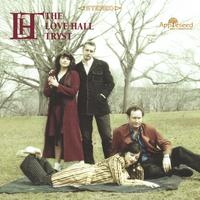
The Love Hall Tryst
(featuring John Wesley Harding)
Songs of Misfortune (2005)

“The Love Hall Tryst, the side project from John Wesley Harding, finds the elegant and razor-tongued troubadour rubbing shoulders with British folk giants like the Watersons, the Copper Family, and A.L. Lloyd. A companion piece to his 2005 historical novel ‘Misfortune,’ these Songs of Misfortune are sung mostly a cappella by Harding , singer/songwriters Kelly Hogan and Nora O'Connor, and Edinburgh-based comic/actor/baritone Brian Lohmann. The four voices blend remarkably well. . . This is classic English folk music with a twist. . . . There is a bawdy joy that radiates throughout. It’s as if Harding and his co-conspirators were actually conspiring against something rather than painting in the audio portion of a grand fairytale, and it’s a testament to their infective mischievousness that the listener so effortlessly gets swept right up along with them.”
– All Music Guide |
| “A sublime collaboration with world class roots-pop chanteuses Kelly Hogan and Nora O'Connor . . . a bewitching collision of modern sensibility and classic songcraft . . . performed with minimal instrumentation and luminous vocal interplay, tapping a vein of timeless melancholy that complements Harding’s neofolkie roots." – Time Out New York |
“. . . An authentic English folk record of songs that could have been (and in some cases, were) written more than 200 years ago. The quartet creates a fascinating vocal atmosphere on these ancient and contemporary tales of jealousy, lust, revenge, murder and justice. And while hangings and infant mortality abound, Wes and his talented cohorts make it warm and inviting. For the a cappella challenged, Wes included a pair of electric arrangements with guitarist Kurt Bloch on board.”
– Brian Baker, Harp |
“For those who haven't read Wesley Stace's Misfortune – a novel built on the themes that infuse traditional music – satisfaction can still be found in Songs of Misfortune, a companion to the book performed by the Love Hall Tryst . . . . The songs bear modal harmonies and classic folk motifs: the too-tight apron as a signifier of pregnancy, the roses growing over the grave, the timid outcry of one ‘never heard to speak so free.’ Yet nearly half were penned by Harding, who proves himself as graceful a writer in the traditional mode as the minds behind Fairport Convention in the 1960s. The final two tracks, by Harding’s ‘mediaeval rock’ group the Minstrel in the Galleries, exhibit the fire of Fairport’s early work . . . The interpretations are heartfelt. You'll hang on every word of both of Harding's retellings of ‘Lord Bateman’ – a cappella and electric – no matter how many times you've heard it before.
– Pamela Murray Winters, Washington Post |
“Most of the songs are performed in stunning a cappella arrangements or with very minimal accompaniment. . . . Most of the Songs of Misfortune are traditional ballads including fare like ‘Lord Bateman,’ ‘Female Rambling Soldier’ and ‘Lord Lovel.’ The singing on these songs – and the entire album – is superb. The lead vocals, by various members of the Love Hall Tryst, soar and the harmonies are glorious. In addition to the ballads are a lovely version of ‘Shallow Brown,’ the West Indian sea chantey, and several songs by Harding and one by Leonard Cohen. . . . The lone song that is neither traditional nor Harding’s is an absolutely spine-tingling version of Leonard Cohen’s ‘Joan of Arc’. . . Hearing these songs makes me want to read Stace’s book.”
– Mike Regenstreif, Sing Out!, Winter 2006 |
“[Songs of Misfortune] isn’t Harding’s first foray into old British folk, but it’s certainly his best. The traditional lyrics and melodies that dominate the disc, many adapted by Harding, are top notch . . . The collection feels uplifting. One reason is the preponderance of lilting melodies; another is the fine and spirited singing by Harding and his accompanists, and the spectacular ways their voices blend.”
– Jeff Burger, No Depression |
“Songs of Misfortune – much like the novel – is still way more entertaining than anyone can expect. That’s mostly due to Harding’s appreciation for the contrast between gorgeous voices and grisly ends.
– New York Press |
“An exceptional album . . . The songs are stripped down to a cappella but nothing is lost from having voices alone dominating the music. In fact the simple vocals are meant to emulate authentic music of the 1800s. The Love Hall Tryst chose songs from a dark European past, some traditional, some more modern and all about grave misfortune. It’s a shock to hear these sweet and harmonious voices singing centuries-old tunes of dead children, violence, and murder. These are like tales from the Brothers Grimm put to music: beautiful, magical, dark, and horrific.”
– Emily Poor, Americana Director, KRFP, Moscow, ID |

|


